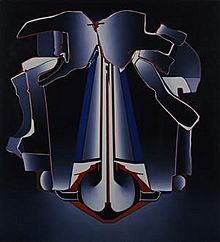Deborah Remington facts for kids
Quick facts for kids
Deborah Remington
|
|
|---|---|

Haddonfield (1965), oil on canvas, Whitney Museum of American Art, New York
|
|
| Born |
Deborah Remington
June 25, 1930 Haddonfield, New Jersey, U.S.
|
| Died | April 21, 2010 (age 79) Moorestown, New Jersey, U.S.
|
| Nationality | American |
| Education | Philadelphia Museum School of Industrial Art, San Francisco Art Institute, |
| Known for | Abstract painting |
| Movement | Abstract Hard-edge painting |
Deborah Remington (June 25, 1930 – April 21, 2010) was an American artist. She was famous for her abstract paintings. Her art is often described as "Hard-edge painting." This style uses sharp, clear lines and shapes.
In the 1950s, she joined the "Beat Generation" art scene in San Francisco. Later, in 1965, she moved to New York City. There, her unique painting style became even stronger. Her career really took off in New York. In 1983, a special show of her work from twenty years was held in California.
Deborah Remington's art was shown in over thirty solo exhibitions. It was also part of hundreds of group shows. These included three important shows at the Whitney Museum of American Art. She was related to the famous artist Frederic Remington.
Contents
Who Was Deborah Remington?
Deborah Remington was born in 1930 in Haddonfield, New Jersey. Her parents were Malcolm VanDyke and Hazel Remington. From a young age, she loved art. As a teenager, she took art classes at the Philadelphia Museum School of Industrial Art. In 1955, she earned her art degree from the San Francisco Art Institute. She studied there with a famous artist named Clyfford Still.
Starting Her Art Career
After finishing art school, Deborah became part of the "Beat" art group in San Francisco. In 1954, she helped start a famous art space called the Six Gallery. She was the only woman among the six artists and poets who founded it.
After graduation, Remington traveled for two years. She visited Japan, Southeast Asia, and India. In Japan, she learned about traditional and modern calligraphy. She also taught English to earn money. This led to her acting in some movies, like "Nightmare's Bad Dream."
Moving to New York City
When she returned to the United States, she focused more on painting. She began showing her art at the Dilexi Gallery in San Francisco. She had solo shows there in 1962, 1963, and 1965. In 1965, Remington moved to New York City. Her first solo show in New York was in 1966 at the Bykert Gallery. She had four more solo shows there between 1967 and 1974.
In 1983, a big exhibition of her work opened. It was called a "twenty-year retrospective." This show started at the Newport Harbor Museum in California. It then traveled to other places, including the Oakland Museum. In 1984, she received a special award called a Guggenheim Fellowship.
In 1999, she was chosen to be part of the National Academy of Design. In the same year, she also received a grant from the Pollock-Krasner Foundation.
When Did Deborah Remington Die?
Deborah Remington passed away on April 21, 2010. She was 79 years old. She died in Moorestown, New Jersey, from cancer. She was buried in Haddonfield, New Jersey.
Where Can You See Her Art?
Deborah Remington's art is in many museums around the world. Some of these include:
- The Art Institute of Chicago, Illinois
- The Auckland War Memorial Museum, New Zealand
- The Bibliothèque nationale de France, Paris
- The Museum Boijmans Van Beuningen, Netherlands
- The Centre national d'art et de culture Georges-Pompidou, Paris
- The Columbus Museum of Art, Ohio
- The Berkeley Art Museum and Pacific Film Archive, California
- The Smithsonian American Art Museum, Washington, D.C.
- The Whitney Museum of American Art, New York
Awards and Special Recognition
Deborah Remington received several important awards for her art:
- In 1999, she was elected to the National Academy of Design.
- Also in 1999, she received a Pollock-Krasner Foundation Grant.
- From 1979 to 1980, she received a National Endowment Fellowship.
- In 1973, she was a special Artist-in-Residence at the Tamarind Institute.

